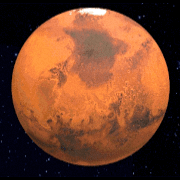Elon Musk's SpaceX is a private aerospace manufacturer and space transportation company founded in 2002.
Its primary goal is to reduce space transportation costs and enable the colonization of Mars.
One of its most ambitious projects is the Starship, a fully reusable spacecraft designed for missions to Mars and beyond.
Starship aims to carry both crew and cargo, with a capacity of over 100 metric tons to low Earth orbit.
The spacecraft is intended to facilitate long-duration space travel, making interplanetary colonization feasible.
As of August 2025, SpaceX has conducted several test flights of Starship, focusing on refining its design and capabilities.
The project represents a significant step toward Musk's vision of making humanity a multi-planetary species
<X>
Mars, often referred to as the "Red Planet," is the fourth planet from the Sun in our solar system.
It has captivated human imagination for centuries due to its unique characteristics and potential for exploration and colonization.
Physical Characteristics
Diameter: Approximately 6,779 kilometers, about half the size of Earth.
Surface: Mars features a rocky terrain with the largest volcano in the solar system, Olympus Mons, and a vast canyon system, Valles Marineris.
Atmosphere: The atmosphere is thin, composed mainly of carbon dioxide (95.3%), with traces of nitrogen and argon. This thin atmosphere results in lower surface pressure than Earth.
Temperature: Average temperatures hover around -63 degrees Celsius, with extremes ranging from -125 degrees Celsius at the poles during winter to 20 degrees Celsius at the equator during summer.
Water Presence
Mars has polar ice caps made of water and carbon dioxide ice. Evidence suggests that liquid water may exist beneath the surface, and ancient riverbeds indicate that water once flowed on the planet's surface.
The Case for Colonization
Colonizing Mars presents numerous opportunities and challenges. Here are some key reasons why colonization is considered essential:
1. Survival of Humanity
Planetary Backup: Establishing a human presence on Mars could serve as a backup for humanity in case of catastrophic events on Earth, such as nuclear war, pandemics, or climate change.
Resource Utilization: Mars has resources that could be harnessed, including water, minerals, and potential energy sources.
2. Scientific Advancement
Research Opportunities: Colonization would allow for extensive scientific research, including studies on Martian geology, climate, and potential for past life.
Technological Innovation: The challenges of colonizing Mars would drive technological advancements in various fields, including robotics, life support systems, and sustainable living.
3. Inspiration and Exploration
Human Spirit of Exploration: Colonizing Mars would fulfill humanity's innate desire to explore and expand our horizons.
International Collaboration: A Mars colonization effort could foster global cooperation in science and technology.
Challenges of Colonization
While the potential benefits are significant, several challenges must be addressed:
1. Environmental Conditions
Radiation Exposure: Mars lacks a protective magnetic field, exposing colonists to harmful cosmic radiation.
Solutions may include building habitats underground or using radiation-shielding materials.
Temperature Extremes: The harsh climate requires advanced life support systems to maintain habitable conditions.
2. Life Support Systems
Sustainable Living: Developing systems for food production, water recycling, and air purification is crucial for long-term survival.
Energy Sources: Reliable energy sources, such as solar panels or nuclear reactors, will be necessary to power habitats and equipment.
3. Transportation and Logistics
Travel Time: A journey to Mars takes about six to nine months, requiring efficient spacecraft and life support systems for long-duration missions.
Supply Chains: Establishing a reliable supply chain for materials and equipment from Earth to Mars is essential for initial colonization efforts.
Steps Toward Colonization
1. Robotic Missions
Initial robotic missions can pave the way for human colonization by:
Conducting surveys to identify suitable landing sites.
Testing technologies for in-situ resource utilization (ISRU).
Establishing communication networks.
2. Human Missions
Following successful robotic missions, human missions can be launched to:
Establish a permanent base.
Conduct scientific research and experiments.
Begin the process of terraforming, if feasible.
3. Building a Sustainable Colony
Long-term colonization efforts should focus on:
Developing self-sustaining habitats.
Creating agricultural systems for food production.
Establishing a governance framework for Martian society.
Conclusion
Colonizing Mars is a complex but achievable goal that could significantly benefit humanity.
By addressing the challenges and leveraging the opportunities, we can take significant steps toward making Mars a second home for humanity.
The journey to Mars is not just about survival; it is about expanding our knowledge, fostering innovation, and inspiring future generations.

















